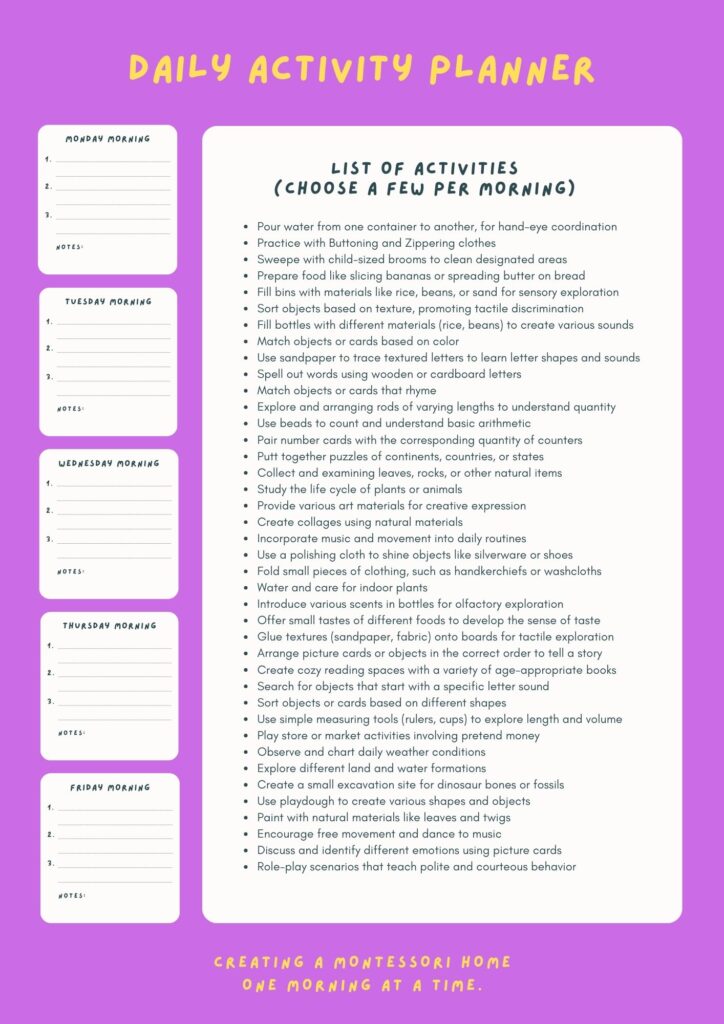Nurturing Creativity and Connection: Daily Activity Inspiration for Kids
Unleashing Creativity: Activity Inspiration with Kids With Free Activity TemplateDaily activity inspiration with kids goes beyond mere engagement; it’s an opportunity to nurture their creativity, curiosity, and social skills. Incorporating a variety of activities ensures a dynamic and enriching experience, creating lasting memories for children. Embracing Montessori principles in selecting activities for children lays a strong foundation for holistic development.
Outdoor adventures provide endless opportunities for exploration and physical activity. Nature walks, scavenger hunts, and backyard picnics encourage children to connect with the natural world, stimulating their senses and nurturing an appreciation for the environment.
Artistic endeavors unleash children’s imagination and self-expression. Painting, drawing, and crafting allow them to explore colors, textures, and shapes while developing fine motor skills and creativity. Collaborative projects such as building forts or creating a family mural promote teamwork and communication.
Montessori and activties
Montessori principles emphasize the importance of selecting activities that align with a child’s developmental stage, interests, and abilities. The approach is centered on fostering independence, self-directed learning, and exploration. Here are key principles of Montessori in choosing activities for children:
Child-Centered Approach:
Montessori education places the child at the center of the learning process. Activities are chosen based on the child’s interests, strengths, and developmental needs. By observing and understanding each child individually, educators and caregivers can tailor activities to support their growth and foster a love for learning.
Prepared Environment:
The Montessori environment is carefully designed to promote independence and exploration. Activities are arranged in an orderly and accessible manner, allowing children to freely choose materials and engage in self-directed learning. The environment includes a variety of hands-on materials that encourage sensory exploration, fine motor skills, and cognitive development.
Hands-On Learning:
Montessori activities emphasize hands-on learning experiences that actively engage children’s senses and promote exploration. Materials are designed to be manipulative and self-correcting, allowing children to learn through trial and error. Through tactile experiences and practical tasks, children develop problem-solving skills, concentration, and perseverance.
Freedom within Limits:
Montessori education provides children with freedom within a structured framework. While children are encouraged to choose their activities and work at their own pace, there are clear boundaries and expectations in place. Children learn to respect the rights of others, take turns, and care for the environment as they navigate their learning journey.
Mixed-Age Grouping:
In Montessori classrooms, children of different ages learn and play together in a mixed-age environment. This allows younger children to learn from older peers and older children to reinforce their understanding by teaching younger ones. Mixed-age grouping promotes collaboration, empathy, and social development, creating a supportive community where children learn from one another.
Follow the Child:
Montessori educators follow the child’s lead and adapt activities based on their individual interests and progress. Rather than imposing a rigid curriculum, educators observe children’s interests and provide materials and experiences that spark curiosity and exploration. This approach allows children to take ownership of their learning and develop a sense of autonomy and confidence.
Respect for Developmental Milestones:
Montessori activities are designed to respect the natural progression of child development. Materials and experiences are developmentally appropriate, challenging children to reach their full potential while ensuring they feel supported and successful. Activities are scaffolded to build upon previous learning and encourage continuous growth and discovery.
In essence, the principles of Montessori guide the selection of activities by emphasizing the importance of child-centered, hands-on learning experiences within a prepared environment. By following the child’s interests, providing freedom within limits, and respecting developmental milestones, Montessori education fosters independence, curiosity, and a lifelong love for learning.
FREE TEMPLATE
Our FREE TEMPLATE serves as a structured guide, streamlining planning and execution while ensuring consistency and efficiency. It facilitates organization and standardization, saving time and effort in activity preparation and implementation.
Cooking and baking offer a delicious way to engage children in hands-on learning. Involving them in meal preparation teaches important life skills such as following instructions, measuring ingredients, and practicing kitchen safety. Plus, it’s a wonderful opportunity to bond over shared experiences and savor the fruits of their labor together.
Indoor activities like reading, storytelling, and board games provide valuable opportunities for learning and connection, especially during inclement weather or quiet moments. These activities foster literacy, critical thinking, and social interaction while nurturing a love of learning.
Ultimately, daily activity inspiration with kids is about fostering a sense of wonder, exploration, and joy in their everyday lives. By providing diverse and engaging experiences, parents and caregivers can ignite children’s curiosity and cultivate meaningful connections that last a lifetime.

In conclusion, embracing the principles of Montessori education offers invaluable guidance in choosing activities for children. By prioritizing independence, exploration, and hands-on learning, Montessori principles encourage the development of critical skills such as problem-solving, creativity, and self-motivation. Through a carefully curated selection of activities, children can engage in meaningful experiences that cater to their individual interests and developmental needs. By incorporating Montessori principles into daily routines, parents and educators create environments that inspire curiosity, foster independence, and nurture a lifelong love for learning. Embracing these principles not only enhances children’s educational journeys but also lays the foundation for their holistic development and future success. Explore the world of Montessori-inspired activities and witness the transformative impact they can have on children’s growth and exploration.
This article may contain affiliate links. If you use these links to purchase an item we may earn a commission.
Grab your free download
Explore our array of free downloads, templates, and guides designed to support your Montessori journey.




